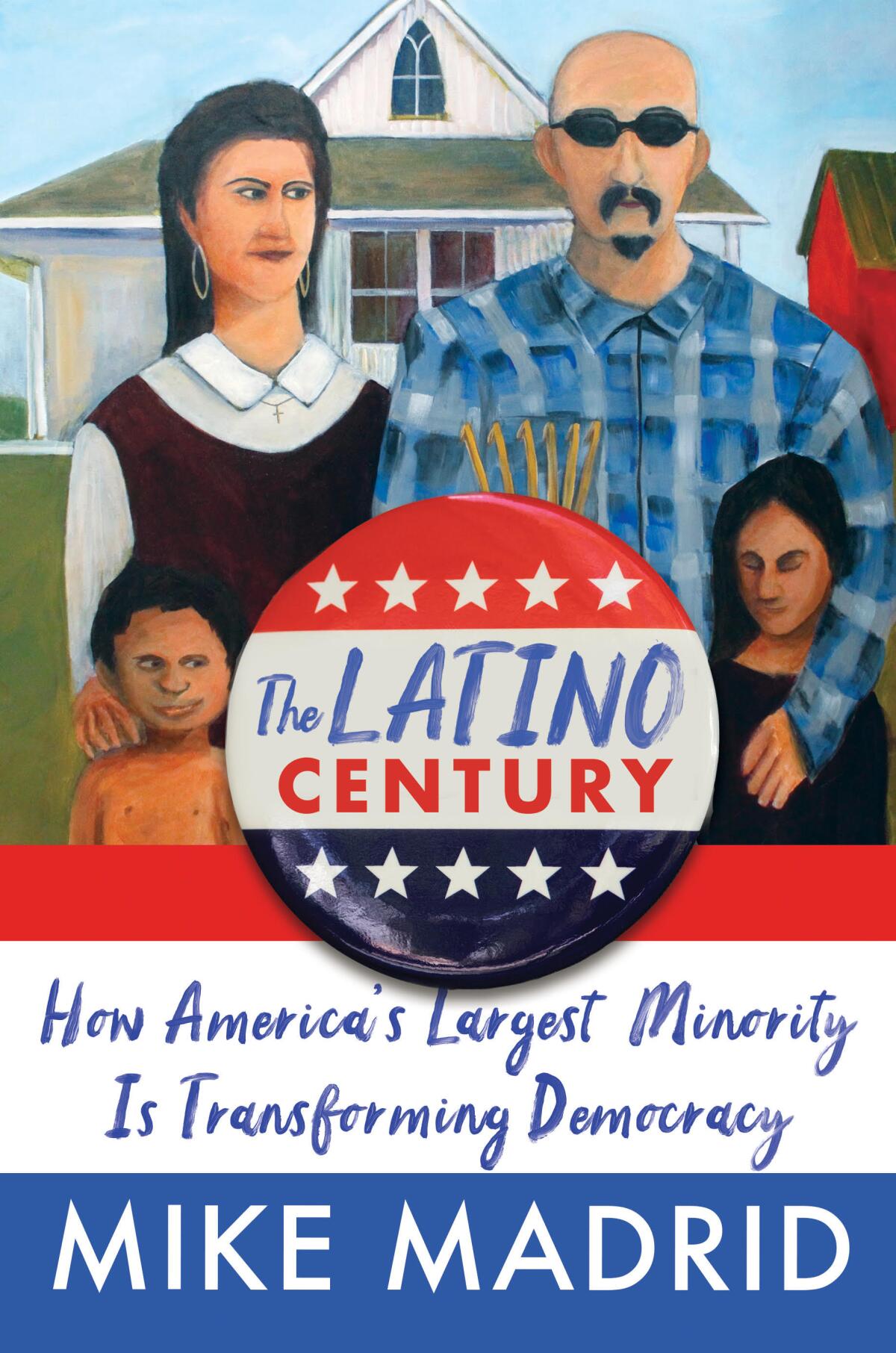Will Latinos be the decisive vote in the 2024 presidential election? This political consultant thinks so

For three decades, Mike Madrid has been tracking the seismic shifts in the Latino electorate.
In that time, the Republican political consultant has noticed a population becoming predominantly U.S.-born and increasingly English-speaking. It’s a change in the electorate the Democratic Party is ignoring, he says.
Democrats’ “whole strategy for most of my career was to run against Pete Wilson and Prop. 187, and I get that,” Madrid said, referring to the former GOP governor’s successful initiative to make it California law to deny social services to undocumented immigrants.
You’re reading Latinx Files
Fidel Martinez delves into the latest stories that capture the multitudes within the American Latinx community.
You may occasionally receive promotional content from the Los Angeles Times.
“But you know, you can run on that maybe two or four years afterward. They were running on it 20, 25 years afterwards. And it’s just so particularly ingrained in their inside baseball mentality.”
Meanwhile, “Latinos have been screaming at us through polling data for 30 years,” he said. “Jobs, the economy, upward mobility, housing, education and healthcare — middle-class, basic getting-through-life stuff — this is what the data tells us they care about.”
This alleged disconnect between the Democratic Party and Latino voters is a key theme in Madrid’s “The Latino Century: How America’s Largest Minority Is Transforming Democracy,” released this week by Simon & Schuster. Part memoir and part explainer, the book provides a comprehensive breakdown of how and why the Latino electorate is so misunderstood.
Madrid, a co-founder of the Lincoln Project, a “Never Trump” political action committee, says that he hopes “The Latino Century” serves as a wake-up call for the Democratic Party to stop taking Latino voters for granted ahead of such a consequential election.

I spoke with Madrid on the heels of his book release. The following interview has been edited for clarity and length.
What was the impetus for your writing this book?
I’ve been researching and looking at the data and doing campaigns all over the country with Latinos for over 30 years. I realized the time to put what I’ve learned in writing was right after the 2020 election — we saw a historic slide of Latinos away from [Democrat Joe] Biden.
The Democrats were either dismissing it or saying it wasn’t happening. And it occurred to me that they probably needed some help in understanding the Latino vote. I realized I needed to write a book and explain what was going on — before the 2024 election — otherwise we risk sliding into a really, really dark place.
Ironically, if Trump is reelected, he will do it with a historically high number of Latino voters, and that doesn’t sit right with me.
De Los recently quoted you in a story about how 1 in 5 Latino voters were considering casting a ballot for a third-party candidate like Robert F. Kennedy Jr. Can you tell me more about why this trend in the electorate didn’t surprise you?
The whole thesis of the book is that neither party understands our community, and neither party has given due diligence to it. As a result, Latino voters are responding to that reality in myriad different ways. One of the main ones is [by] responding to candidates who are attacking their own parties and saying the parties themselves are not working.
It’s particularly ironic because Latinos by every metric have a higher trust and confidence in all of our social institutions. That fact is a really big reason why the book is optimistic, and I believe that in this current fragile state of our democracy, Latinos are replenishing the values that can keep this country going forward. I feel so passionately about that.
So when I see this populism, this antiestablishment sentiment in our community, it’s really contained to the political parties. Everything else, whether it’s higher education, church, government or the military, there’s very high levels of trust and support and confidence. The two areas where we are rejecting it with this very antiestablishment movement is with both political parties.
You’re a data-driven guy. What does the data say about who Latinos are?
Well, it’s both who we are and who we are becoming. Two-thirds of us are U.S.-born. The fastest-growing segments of our community are third-generation and fourth-generation. Over 60% of us are Mexican American. We’re increasingly becoming part of the non-college-educated, blue-collar workforce.
There’s a very large divide between our women, who are going to college at higher rates, and our men — which is going to have massive impact in our institutions and our society. We have the largest gender gap out of the four largest racial or ethnic groups in the country.
There’s a lot happening very, very quickly, and it’s why I think nobody here really has a good grasp on this.
Latinos have a much weaker partisan anchor than any other race or ethnicity in the country. We have lower turnout rates in large part because neither party is saying anything that we’re buying.
We are the moderates in both parties, and both parties are currently obsessed with playing to their extremes. There’s this massive disengagement, and the Democrats refuse to believe it because their whole worldview is “Non-white voters can’t be anything other than Democrats.”
That’s why I say Republicans are the beneficiaries of this, but it’s not because of anything that they’re doing. In fact, what they’re doing is restricting further growth.
There’s two bad options, and a lot of Latinos are opting out.
So since we’re talking about there being a general misunderstanding of who Latinos are, one of the biggest misconceptions I think that still exists, and one that’s very pronounced, is this idea that we all speak primarily Spanish. Can you talk to me about what role language plays when it comes to polling Latinos?
This has been one of the largest public criticisms I’ve made about Democrats — generally it’s one or two firms specifically that have really led them down a road of disaster over the last 10 years.
I had my book launch Tuesday, and John Perez, the former speaker of the California State Assembly, came and kicked off all the festivities. He’s a dear friend, one of the brightest members I’ve ever worked with.
He represented the most Latino Assembly district in California, and he said that when his consultants — white consultants, incidentally — wanted to start communicating to the voters, they wanted to do it in Spanish or bilingual platforms. John said, “No, let’s do polling. Let’s look at this with a number of different methodologies to determine what language these voters want to reach out to.”
And what his research showed was that only 25% of Latinos — of voters in the most Latino Assembly district in the entire state — wanted communications in Spanish. That is a shocking, striking number to most people who don’t understand the community. They all think it’s 80-85%.
Again, this is not Mike Madrid saying it. This is one of the most progressive Democratic Latinos representing the most Latino district in the state. His own research was saying it was 25% 15 years ago, when we were much more of an immigrant and naturalized constituency.
Today that number has probably dropped to 17%, 15%, maybe. Let’s just say it’s stayed the same; it’s still far lower than where one or two Democratic firms that are really influencing the narrative here are polling at. Ask any credible pollster.
We’ve interviewed Latino pollsters in the Democratic Party, and most of them say that if you have 15-17% Spanish-language interviews, you’ll have a credible baseline standard. I would agree, and I wouldn’t even mind erring by another 3 to 4% — going to maybe 20%, which is high.
But some of these firms — and when I say some, I mean one or two — are polling with 35% Spanish-language interviews. And, no surprise, their results are very, very skewed towards more immigration-related issues, more skewed towards issues that affect the recently naturalized.
That direction is exactly the opposite of where the Latino electorate is going quickly, rapidly, measurably, and by very, very big numbers. The Democratic Party has been left in the exact opposite direction of where they should be going. And this is all demonstrable.
Let’s talk about Donald Trump. We have a presidential election in a little over four months, and he’s one of the candidates. A portion of your book also focuses on the work you did with the Lincoln Project to prevent him from winning in 2020. How do you think he’s going to fare this time around with Latino voters?
That’s a really tough question. I don’t mean to dodge it. That’s a little unfair because I don’t have the access to the data and analytics that I’ve had for the past 30 years by working on a campaign.
But what I will say is this: All of the data — all of the publicly available data — is showing higher levels of support for Trump than any Republican candidate since I was involved with independent efforts with George W. Bush in 2004.
This is not a prediction. It’s equally as plausible that Trump could get 27% of the Latino vote as it is that he could get 45%. That’s all dependent, I think, on what the Democrats do and if they can make the adjustments. And that’s why I’m ringing the alarm bells here before they run out of time to fix this problem.
If the election were held today, I believe Donald Trump would get more than the 37% of Latino votes that he got in 2020. I think he would get about 40-42%. Which, by the way, is enough. Everything else being equal, he would win Arizona. He would win Nevada. He would win Georgia. He would win Wisconsin.
And at least three of those states have significant Latino populations.
All of them do! There’s more Latino voters in Wisconsin than Black voters now.
Oh, really?
Oh yeah. Georgia’s share is a little bit smaller, but it’s still about 50,000 voters in a race that was won by 30,000 votes last time. But Wisconsin, as a percentage, has more Latinos than Georgia. In every one of the swing states, the number of Latino voters is bigger than the 2020 margin of victory.
For 30 years, I’ve been asked this question by all types of reporters: “Are Latinos going to be the decisive vote in this election?” I said no. In 2024, for the first time in my career, I’m saying yes — Latinos will be the decisive vote.
They will determine the outcome of Nevada. They will determine the outcome of Arizona. They will determine the outcome of Wisconsin. They will likely determine the outcome of Georgia and will absolutely determine the outcome of North Carolina.
What can the Democrats do between now and November to shore up the Latino vote, to prevent Trump from getting 40-42% of their votes?
Two things. The first is [that] if Biden went to the Rose Garden today and announced a Latino Marshall Plan for housing to dramatically stimulate the home construction space, you would see those numbers start dropping immediately for Trump.
One in 5 Hispanic men work in residential construction or a related field. Interest rates have tripled in the last four or five years. Tripled. Since the Trump era, the currency has devalued by 20% because of inflation in the last five years. You cannot tell me that a U.S.-born, English-speaking Latino construction worker is better off now than he was during the Trump administration. You can’t credibly say that.
I don’t care where the Dow is at. I don’t care what the GDP growth is. I don’t care what employment numbers are. One in 5 Hispanic men — 20% of our men — work in the residential construction industry or a related field, [as a] Realtor or mortgage broker. All of that has contracted. It is completely shut down. That means Latino construction workers not only can’t build housing and put food on the table, but they also can’t buy their first homes, which are already way overpriced because supplies are screwed up.
So when you ask me, what could they do tomorrow? That’s the first thing I would do. Literally tomorrow, do that and those numbers would come back into a more historical range. Would it fix the whole problem? No. Could it make the race a hell of a lot more advantageous for Biden? 100%.
The second is — here’s what I really don’t get — Joe Biden is drilling more oil than Sarah Palin’s greatest fantasy; why aren’t they taking credit for it? Because they’re afraid of their left flank. They think that they are going to leave them, but they’re not going to.
You know that, right? That we’re producing more domestic oil than at any time in the history of this country?
No, but I’m not surprised.
Yeah! Why is he not talking about that? Would that help in the Rio Grande Valley in Texas? Of course it would. Would it help in southern New Mexico and California’s Central Valley? Of course it would. Is it going to get him 20 or 30 points? No. Will it get him 4 or 5%? It will, 100%.
So start talking about that part instead of “Build Back Better” and Bidenomics. Oh, yeah, we’ve got money for infrastructure to build bridges in 2045, but that means nothing to working-class people.
Go in and do something and talk about your domestic energy policy. You’re doing it, so take credit for it. At least get some upside for it.
If you buy books linked on our site, The Times may earn a commission from Bookshop.org, whose fees support independent bookstores.
Consider subscribing to the Los Angeles Times
Your support helps us deliver the news that matters most. Become a subscriber.

Things we read this week that we think you should read
From the Los Angeles Times
Rafa Márquez, Mexico’s greatest soccer player, is the subject of a new Netflix documentary
After the success of Netflix’s “Beckham” and “Pelé” soccer documentaries, the streamer now turns to the life of Rafa Márquez, arguably Mexico’s greatest footballer. “Rafa Márquez: El Capitán” offers an in-depth look into the player, from his early life to his relationship with his father. De Los contributor Ivan Fernandez spoke with Marquez about the documentary.
Música mexicana star Ivan Cornejo announces new tour ahead of ‘Mirada’ album release
In support of his new album “Mirada,” Ivan Cornejo will embark on his biggest tour yet this August. The 20-year-old sad sierreño star will play at the Honda Center in Anaheim on Oct. 12.
The dirty secret of California’s legal weed
In a Times collaboration with industry newsletter WeedWeek, staff writer Paige St. John and Alex Halperin, editor of WeedWeek, look into several popular cannabis products and find high levels of dangerous contaminates amid a lack of oversight.
From Elsewhere
How a real-life murder sentence inspired a new film set in Riverside’s Latino community
When looking for inspiration, screenwriter Victor Adame decided to write about what he knows best — his family. His project “¡Raza!” is based on the story of a family member who was charged for a murder they didn’t commit.
NYC specialized high school offers to Black and Latino students inch up but remain stubbornly low
New York’s specialized high schools are seeing a small uptick in admission offers to Black and brown students. ChalkBeat, a nonprofit newsroom dedicated to education reporting, says 4.5% of the schools’ offers went to Black students and 7.6% to Latino students, a small increase from last year’s 3% for Black students and 6.7% for Latinos. Despite incorporating new programs and emphasizing diversity, the prestigious schools in the East Coast city remain largely segregated.
— Cerys Davies
The Latinx experience chronicled
Get the Latinx Files newsletter for stories that capture the multitudes within our communities.
You may occasionally receive promotional content from the Los Angeles Times.





